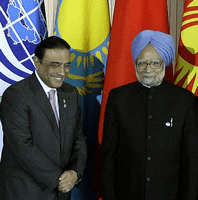ISLAMABAD, Pakistan -- The leaders of Pakistan and Indian recently agreed to restart the stalled "peace" process between the two countries. Known as the "Composite Dialogue," the talks were suspended after the Mumbai terrorist attacks in November 2008, which India blamed on Pakistan-based militant outfits, primarily Lashkar-e-Tayyaba (LeT). India, however, has limited the focus of any future talks between foreign secretaries to the issue of cross-border terrorism, thereby limiting optimism about their chances of success as well.
Indian Prime Minister Manmohan Singh and Pakistani President Asif Ali Zardari agreed to resume the Composite Dialogue during a meeting on the sidelines of last week's Shanghai Cooperation Organization (SCO) summit at Yekaterinburg, in Russia.
India's willingness to restart talks is surprising, given the recent dismissal of charges against LeT chief Hafiz Saeed by a Pakistani court, due to "lack of evidence" proving his involvement in the Mumbai attacks. Nevertheless, India's unequivocal insistence that the talks be focused on the single issue of terrorism signals that New Delhi continues to have reservations regarding the sincerity of Pakistan's efforts to restrain militants operating from Pakistani soil.

